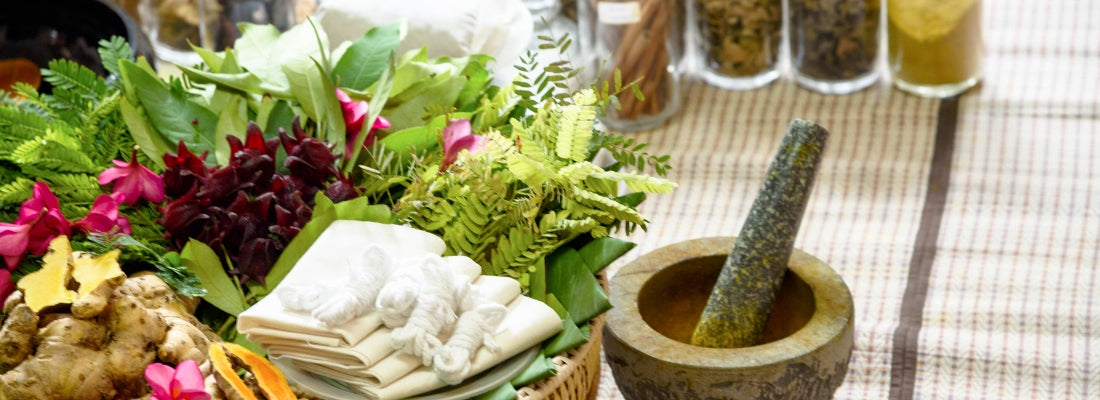Ayurveda uses a variety of dried herbs and flowers in its treatments to promote health and balance in the body. These natural remedies are utilized in various forms, including powders, teas, oils, and pastes. Here are some common dried herbs and flowers used in Ayurvedic treatments, along with their benefits and applications:
Dried Herbs
-
Neem (Azadirachta indica)
- Benefits: Antibacterial, antifungal, detoxifies the blood, supports skin health.
- Applications: Neem powder can be used in face masks, as a paste for treating skin conditions, or taken internally as a supplement.
-
Amla (Phyllanthus emblica)
- Benefits: Rich in Vitamin C, boosts immunity, supports digestive health, antioxidant properties.
- Applications: Dried amla powder is used in hair and skin care products, can be taken internally to support overall health.
-
Ashwagandha (Withania somnifera)
- Benefits: Reduces stress, improves energy levels, supports immune function, enhances cognitive function.
- Applications: Commonly consumed in powder form, mixed with milk or water, or taken as a capsule.
-
Triphala
- Ingredients: A combination of three dried fruits—Amalaki (Emblica officinalis), Bibhitaki (Terminalia bellirica), and Haritaki (Terminalia chebula).
- Benefits: Supports digestion, detoxifies the body, promotes regular bowel movements.
- Applications: Available as a powder or capsule, often taken with warm water before bed.
-
Shatavari (Asparagus racemosus)
- Benefits: Supports female reproductive health, promotes lactation, balances hormones.
- Applications: Dried root powder can be mixed with warm milk or water, taken as a supplement.
Dried Flowers
-
Rose (Rosa damascena)
- Benefits: Calms the mind, supports skin health, improves digestion.
- Applications: Dried rose petals can be used in teas, bath soaks, and as a face mask ingredient.
-
Chamomile (Matricaria chamomilla)
- Benefits: Reduces stress, aids sleep, soothes digestive issues, anti-inflammatory.
- Applications: Commonly used in herbal teas, can be added to baths or used in skincare products.
-
Hibiscus (Hibiscus rosa-sinensis)
- Benefits: Supports cardiovascular health, rich in antioxidants, promotes healthy skin and hair.
- Applications: Dried hibiscus flowers are used in teas, hair rinses, and face masks.
-
Jasmine (Jasminum officinale)
- Benefits: Relieves stress, enhances mood, supports respiratory health.
- Applications: Dried jasmine flowers can be used in teas, aromatherapy, and skincare products.
Applications and Usage
-
Teas and Infusions
- Preparation: Steep dried herbs or flowers in hot water to make soothing and medicinal teas.
- Examples: Tulsi tea for immunity, chamomile tea for relaxation, hibiscus tea for cardiovascular health.
-
Powders and Capsules
- Preparation: Dried herbs can be ground into fine powders and encapsulated for easy consumption.
- Examples: Ashwagandha powder for stress relief, triphala powder for digestive health.
-
Topical Applications
- Preparation: Create pastes, masks, and oils using dried herbs and flowers for skin and hair treatments.
- Examples: Neem paste for acne, rose water for skin toning, hibiscus oil for hair growth.
-
Aromatherapy and Baths
- Preparation: Use dried flowers in aromatherapy or bath soaks to promote relaxation and well-being.
- Examples: Jasmine flowers for mood enhancement, chamomile for calming baths.

